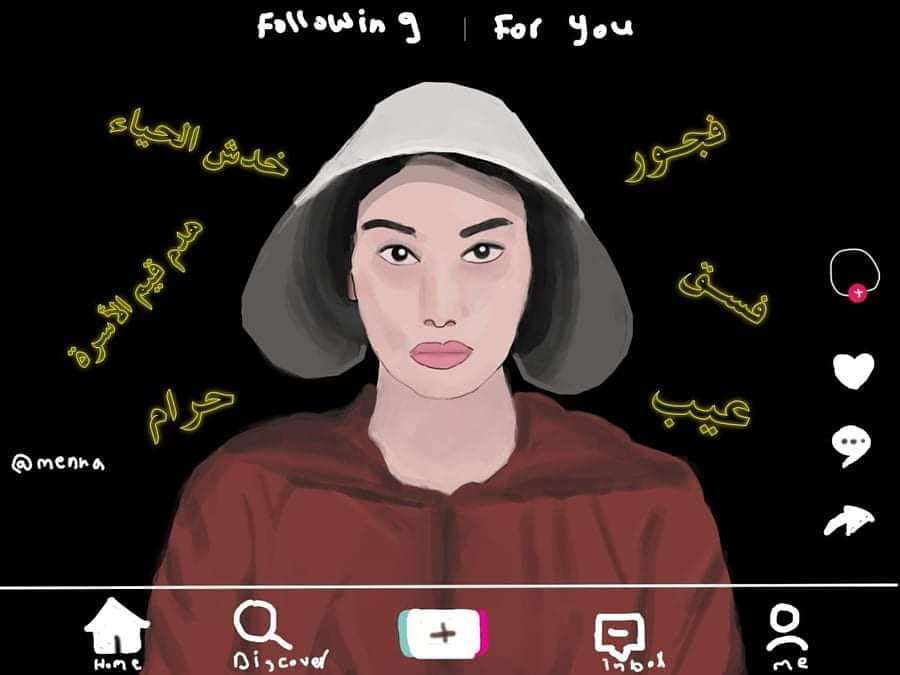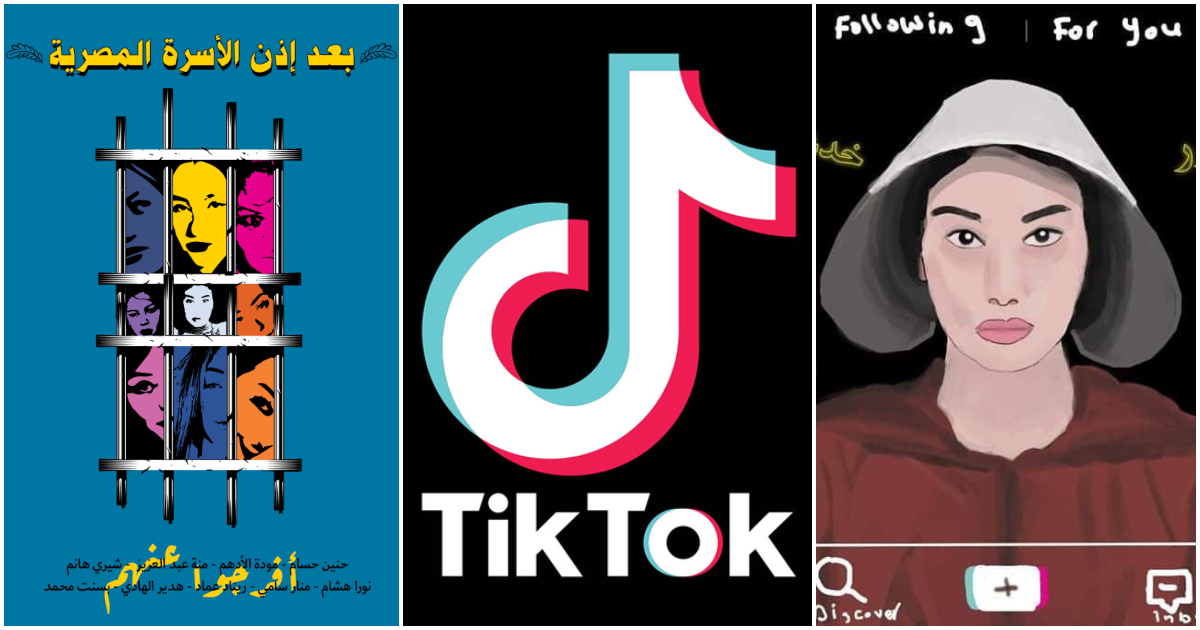
On Monday night, activists in Egypt launched a digital campaign demanding the immediate release of all women arrested on debauchery charges. Over the past few months, Egyptian prosecutors have ordered the detention of 9 women TikTokers under provisions of the country’s controversial 2018 cyber crime law, which criminalizes acts that violate Egyptian family values.
Haneen Hossam, Mawada Al Adham, Menna Abdel Aziz, Sherifa Refaat and her daughter Nora Hisham (known as Sherry Hanem and Zomorroda, respectively), Manar Samy, Renad Emad, Hadeer El Hady and Passant Mohamed are all awaiting trial on debauchery and immorality charges. In most of the aforementioned cases, authorities stated that the arrests were initially prompted by the women’s appearance, choice of dress and dance moves.
مصر: اطلقوا سراح ستات التيك توك – Sign the Petition! https://t.co/RYpkIzhWs8 via @Change
— Kal Naga – أبوالنجا (@kalnaga) July 13, 2020
Using the hashtags #بعد_اذن_الاسرة_المصرية (If Egyptian Families Permit…), activists and social media users have taken to Twitter and Facebook to register their solidarity with the women and offer commentary on the laws they are being charged under and the cultural norms that have inspired it.
Along with the hashtag campaign, a group of anonymous activists launched a petition detailing their demands and shedding light on the details of the state’s campaign against women TikTokers in Egypt.
“We take notice of this systematic and organized crackdown targeting women on TikTok. It starts with men creating content on Youtube picking on women users, who do not align with their moral stance. When these men start calling women out, defaming them and threatening them with imprisonment, they enable a culture of violence that normalizes and justifies punishing named women. The Public Prosecutor follows reports made by those men against women TikTokers, and issues an arrest warrant,” the petition reads.
#بعد_اذن_الاسرة_المصرية pic.twitter.com/NB8uRXamu9
— Hesham Ramadan (@hesham_rama14) July 13, 2020
The activists behind the campaign argue that the Public Prosecution has employed an inconsistent policy in dealing with these cases. Not only is it unconstitutional to criminalize citizens based on their appearance, many have noted that women who come from low income backgrounds are disproportionately targeted by debauchery charges and accusations of violating family values. This is despite the fact that many upper middle class Egyptian women enjoy a great deal more bodily autonomy and personal liberty and are seldom prosecuted for their choice of dress or their public appearance on social media.
“Lately, there has been a collective cheering for the positive role of Cyber Investigation in supporting women with leaked photos or because they are victims of cyber extortion and/or blackmailing. It is the same Public Prosecution that used one of Mawada’s leaked photos as evidence against her,” the activists argue in the petition.
#بعد_اذن_الاسرة_المصرية ليه الدولة تعين نفسها رقيب على حياتنا، ايه الفرق مابين الحرية الشخصية والجريمة؟ التراضي يا بشر.. لو انا بحط صورتي بالبيكيني بمزاجي محدش له عندي حاجة واللي مش عاجبه مايتفرجش. افرجوا عن ستات وبنات التيكتوك
— salma said (@salmasaid) July 14, 2020
They also argue that the prosecution’s position on the case of Ahmed Bassam Zaki—accused by upwards of 50 women of rape, sexual assault, harassment, child molestation, blackmail and extortion—contrasts with its handling of the Menna Abdel Aziz case, a 17-year-old TikToker who publicly accused a man of raping her, only to find herself detained for “violating Egyptian family values.”
Activists, women’s rights defenders and observers cite Zaki’s accusers’ social status—many of his victims are upper middle class women—as the reason why state institutions, including the National Council for Women (NCW), are mobilizing to bring him to justice.
الاسرة المصرية اللي بنات التيك توك بتخدش حيائها دي هي نفس الاسرة اللي بتضرب بناتها بتعملهم ختان تحبسهم وتضهدهم تقولهم لو حد اغتصبكوا غلطتكوا؟ نفس الاسرة اللي البنات طالعة تتكلم عن اخواتهم وابائهم اللي بيغتصبوهم؟ دي الاسرة اللي واحدة لبست شورت خدشت حيائها؟ #بعد_اذن_الاسرة_المصرية
— much angst very sad (@hangryliving) July 13, 2020
“The Public Prosecutor performatively [supports] women victims/survivors in the case of [Ahmed Bassam Zaki], to file reports against Ahmed Bassam Zaki. However, it is the same Public Prosecution that arrested Menna Abdel-Aziz on charges of threatening Egyptian family values after she posted a video calling for help after being raped,” the petition states. “We fear and worry about this systematic crackdown which targets low income women. We can’t ignore the underlying guardianship over TikTok women. Because of their class, they are being punished, and denied their right to own their bodies; to dress freely; and to express themselves.”
The campaign owes its slogan to the Egyptian family values clause in the cyber crime law, which activists and legal experts have long criticized for its vagueness. “If TikTok women are being punished for content that ‘violates the Egyptian family values’, could we at least know what [those values are]? Which family do we mean? Would these values differ if ‘the family’ was rich or poor? Well-known or not? If the person accused was a man or a woman?” the petitioners conclude.
Legal Grey Area
According to prosecutors, however, the charges facing these women range from violating family values, to inciting debauchery, and, in some cases, human trafficking and engaging in commercial sex.
In Refaat and Hisham’s case, prosecutors contend that one of the defendants is a sex worker and that the other facilitates her commercial sex encounters. According to local media, the mother-daughter TikTok duo are also accused of violating Egyptian family values, invasion of privacy, broadcasting “indecent” visual content, running social media accounts for the purpose of committing said crimes, and advertising sex work and “drawing attention to themselves,” pro-government outlet Youm7 reports.
لا يمكن استخدام السجن لفرض نمط أخلاقي معين على الجميع. و لا يجب أن تحتكر الدوله حق تعريف القيم الاسريه و المجتمعيه و لا يجوز أن تمارس الدوله الوصايه على أجساد النساء. نطالب بالإفراج عن فتيات التيك توك فورا. pic.twitter.com/31DLEckxYP
— Yasmin Omar (@yasminoviech) July 13, 2020
Similar accusations have also been leveled at Emad and Samy who face charges of engaging in commercial sex and promoting themselves on social media through “indecent” visual content, local media reports. Also facing charges of inciting debauchery through “indecent” visual content are Hady and Mohamed.
Of all the women arrested in the Ministry of Interior’s ongoing morality campaign, however, Hossam and Al Adham, whose trials have already begun, face the gravest accusations. In addition to charges of “violating Egyptian family values” and inciting debauchery through visual content that authorities have deemed “indecent,” the two women are accused of human trafficking, according to Youm7.
Prosecutors allege that Hossam and Al Adham “lured” young women into using live broadcast features to exploit them, but no further details were made available as far as the elements of said crime in both cases or how the defendants exploited the alleged victims. Prosecutors also contend that the two received monetary compensation for the views their content has received, which many argue doesn’t constitute a crime, especially given Egypt’s booming influencer marketing industry.
(1) There’s a new campaign in Egypt #بعد_اذن_الاسرة_المصرية that calls on Egyptian authorities to stop targeting women for their TikTok activity & that calls on the National Council for Women to provide legal support for the 9 women currently in detention for this activity.
— Mai El-Sadany (@maitelsadany) July 13, 2020
One of the more polarizing cases is that of Menna Abdel Aziz. Once an obscure figure on social media, the 17-year-old shot to national notoriety last May after publicly accusing a man of raping her with the help of his friends who beat and filmed the assault. Her allegations were confirmed by the police.
The rapist, Mazen Ibrahem, and his accomplices were detained and charged with rape, conspiracy to commit kidnapping, robbery, assault, using drugs, invasion of privacy, blackmail, and violating Egyptian family values, among other things. Abdel Aziz was also detained and now faces charges of inciting debauchery and “violating Egyptian family values” for her choice of dress and dance moves on TikTok.
The Head of NCW told the #unhrc that violence against women and girls is a priority but it seems that @ncwegypt
only defends rich women and girls.We are calling on the NCW to provide legal support to the 8 women who were arrested for using #TikTok #بعد_اذن_الاسرة_المصرية https://t.co/JJaF1NARtn
— Salma El Hosseiny (@salma_ishr) July 13, 2020
Prosecutor general Hamada Sawi later ordered her confinement at a battered women’s shelter operated by the Ministry of Social Solidarity for the remainder of her pretrial detention, but critics were quick to point out that his handling of the case—charging an underage rape victim with inciting debauchery due to her choice of clothes—sets a dangerous precedent and enables rape culture.
In the Court of Public Opinion
Critics of the government argue that law enforcement and the justice system are criminalizing women from poor backgrounds and question the veracity of the investigative methods employed by the state in these cases and the lack of concrete evidence, namely on charges of human trafficking and sex work.
Those who support the state’s position, however, contend that two women have reportedly confessed to engaging in commercial sex, but it isn’t clear how these confessions were obtained and whether they are admissible in court.
What most observers seem to agree on, however, is that these arrests were heralded by new law enforcement directives, adopting policies aimed at protecting public morality, which saw the Ministry of Interior’s General Department for the Protection of Moral Values pursue these women.
This new direction didn’t come without opposition, however. Members of Egypt’s human rights community warn that enforcing these policies through vaguely worded laws could result in grave human rights violations, especially in a country where the crackdown on freedom of expression and freedom of conscience has been ramped up in the past few years.







Comments (55)
[…] laws to regulate user-created content may do the same thing. A new Egyptian social media campaign (#If Egyptian Families Permit) to free the arrested young female TikTok users makes just this […]
[…] ?We take notice of this systematic and organized crackdown targeting women on TikTok. It starts with men creating content on Youtube picking on … View full source […]